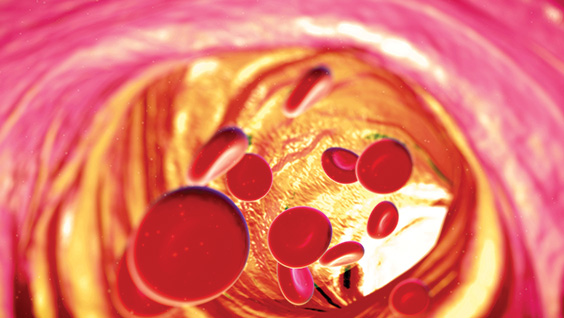In a new study by Masanobu Komatsu, Ph.D., associate professor in the Cardiovascular Pathobiology Program and Tumor Microenvironment and Metastasis Programs, a cellular protein called R-Ras was found to suppress the effects of vascular endothelial growth factor (VEGF), a signaling molecule that helps create new blood vessels and is overexpressed in many tumors. The findings create a new route to treat cancer as well as certain causes of blindness and ischemic diseases.
“These results are the first showing that R-Ras can directly inhibit VEGF signaling that activates endothelial cells—the cells that line the inside of blood vessel walls and promote angiogenesis,” said Komatsu. “We found that R-Ras works by inhibiting the VEGF receptor from sending stimulatory signals in endothelial cells. Since tumor cells exploit the VEGF pathway to advance angiogenesis, our findings present a new opportunity to restore normal blood vasculature and may have a profound effect on diseases that cause, or are caused by, abnormal blood vessels.”
Angiogenesis is the process of forming new blood vessels and requires the development and growth of endothelial cells. Angiogenesis is also a fundamental step in the transition of benign tumors to malignant by creating new vessels that supply tumors with oxygen and nutrients to grow and spread. However, new tumor vessels are often more permeable—or leaky—compared to normal vessels, a feature that influences drug delivery and tumor metastasis.
For some time, scientists have understood that VEGF is instrumental in the process, by binding a receptor (VEGR receptor) on the surface of endothelial cells and triggering the growth and survival of new vessels. Komatsu’s previous research reported on the direct impact of R-Ras on tumor vasculature in vivo. The latest research, published in the Journal of Biological Chemistry, illustrates that R-Ras controls the process by inhibiting the autophosphorylation—or activation—of the VEGF receptor.
“Now we are investigating what controls R-Ras gene expression in endothelial cells, which is significantly reduced in diseased blood vessels,” said Komatsu. “We will then know how to boost cell levels of R-Ras and trigger its beneficial effects. We are also exploring drug screens and gene therapy to achieve this goal.”
Leaky vessels Faulty blood vessels and abnormal vessel growth can cause a myriad of health problems. In diabetics and in individuals with macular degeneration, the condition is the number one cause of blindness. Blood vessels beneath the retina that leak blood and/or fluid can cause permanent damage to light-sensitive retinal cells, leading to blindness.
In cancer, tumors need to create new vessels in order to continue to grow, but the vessels they create are often leaky, allowing tumor cells to penetrate into the circulation and metastasize to other parts of the body. Additionally, leaky vessels hinder the effectiveness of cancer drug delivery and negatively impact radiation therapy.
Ischemic diseases, such as peripheral arterial disease and coronary artery disease, have been experimentally treated by VEGF administration in a number of clinical trials. But the vessels formed are often unstable and fail to provide prolonged benefits. The effect of R-Ras to counteract VEGF activity may help balance vessel growth to generate more functional vessel networks.
The study can be read in full here.
